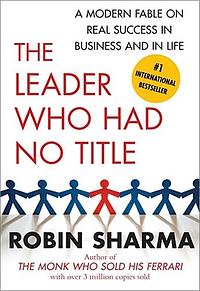Take a photo of a barcode or cover
57 reviews for:
The Leader Who Had No Title: A Modern Fable on Real Success in Business and in
Robin S. Sharma
57 reviews for:
The Leader Who Had No Title: A Modern Fable on Real Success in Business and in
Robin S. Sharma
reflective
medium-paced
No lo terminé, la verdad no era lo que estaba buscando
reflective
slow-paced
I wanted to enjoy this book more, and I can appreciate the concepts of trying your best with everything you do, however encouraging people to go above their pay grade for nothing is unlikely to result in more wealth.
slow-paced
It was awful. Just awful. The characters were neither believable or likable. I understand the author’s point- leadership does not always come from formal authority- but it was so poorly written I asked my leadership team to remove it from our mentor reading list. Even listening at 1.75 speed I groaned every time I had to listen to the book and could not wait for it to be over.
emotional
inspiring
reflective
medium-paced
So terrible. Weak parable to provide lessons that could best be given in a 1-page summary. Narration of audio book is terrible.
Awful writing. The message got lost among the unbelievable set up of conversations between Blake and the people he met. The strangest “self help” book I’ve read so far. I don’t even know if I fully agree with the message that was trying to be conveyed. “Work hard, and long hours, and feel like a leader within yourself instead of getting equitable compensation and acknowledgment for the effort you put in.”
There is something to like about this book, in the sense that it encourages people to take responsibility for themselves and look for ways to better their lives and the lives of the people around them. However, Sharma fails to nuance this position in important ways - for example by talking about the ways the teams and communities we are in affect us in powerful ways and are, in fact, an essential part of who we are.
The final chapter of the book, in particular, I found troubling. There is a lot of talk of personal awesomeness and the power of positive thinking. Sharma does not bother to mention that calling negative thoughts "germs" that ultimately attract an unhealthy way of thinking is, in itself, a sort of path to mental illness. If we do not make space for negative thoughts and then expose them to objective judgement, we end up ignoring large parts of our own personalities. The expectation that we are always positive and never entertain negative thoughts is crushing and can be harmful. Far better to engage with the Stockdale Paradox as described by Jim Collins, if that's your sort of thing. This was only one of many problems I saw in the final chapter, and I think it undermined any other value that could be uncovered in the book. I'd say skip this book and look for books that explore similar, important themes from a more nuanced perspective.
The final chapter of the book, in particular, I found troubling. There is a lot of talk of personal awesomeness and the power of positive thinking. Sharma does not bother to mention that calling negative thoughts "germs" that ultimately attract an unhealthy way of thinking is, in itself, a sort of path to mental illness. If we do not make space for negative thoughts and then expose them to objective judgement, we end up ignoring large parts of our own personalities. The expectation that we are always positive and never entertain negative thoughts is crushing and can be harmful. Far better to engage with the Stockdale Paradox as described by Jim Collins, if that's your sort of thing. This was only one of many problems I saw in the final chapter, and I think it undermined any other value that could be uncovered in the book. I'd say skip this book and look for books that explore similar, important themes from a more nuanced perspective.


